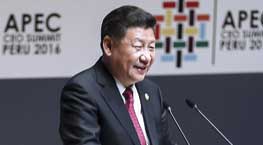By Raimundo Urrechaga
HAVANA, Nov. 27 (Xinhua) -- China and Latin America need to work together and learn to know each other better in order to have lasting cooperative ties that benefit both sides, said a renowned Cuban researcher on China.
In a recent interview with Xinhua, Jose Luis Robaina, a member of Cuba's International Policy Research Center, said that over the past two decades, Beijng has become a major trading partner for the region and this cooperation should be consolidated and expand.
"China and Latin America should chart their long-term cooperation with a strategic vision to diversify economic relations," he said.
The Cuban expert praised Chinese President Xi Jinping's recent speech at the 2016 APEC CEO Summit in Lima, Peru, for showing the Chinese leadership's commitment to the idea of common growth.
"China's foreign policy is based on peaceful coexistence and economic cooperation, as shown in international forums where it participates. It was evident in President Xi Jinping's speech at APEC that Beijing seeks to encourage open and inclusive trade agreements to benefit all parties," he said.
"China is seeing unprecedented internal and external expansion. That is why I believe it can move on to a new stage in its economic relations with Latin America," said Robaina, who urged the two sides to move to a broader and more diverse cooperation that leads to greater mutual development.
The expert also urged China and Latin America to think about greater joint projects for the industrial development of the continent.
"Xi's visit to the region and his participation in the APEC meeting marked a new phase in China's relations with Latin America. ... China is seen as a reliable and long-term partner," he said.
As an example, he cited important projects in which China has an active participation, including the Trans-Oceanic Railway linking the Atlantic and Pacific Ocean.
Robaina said that a fundamental premise for expanding cooperation is that both sides must have "mutual knowledge" about each other's culture and history.
"It is a must to achieve this mutual knowledge. China invests a lot to train personnel who then come to Latin America with a cultural and historical background about the region. Every year, there is also a growing interest in the region to learn Chinese and know more about China's traditions," he said.











